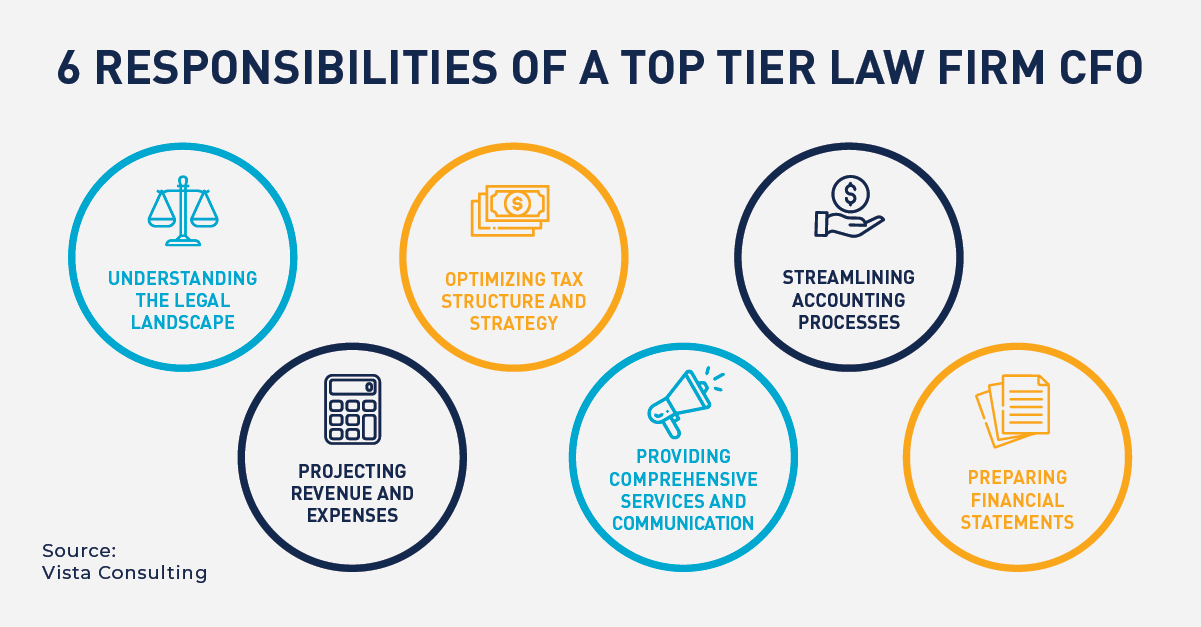
In this blog we discuss the six responsibilities of a plaintiffs law firm CFO and how the CFO can navigate your firm to financial success, featuring insights from Tim McKey, CEO of Vista Consulting, who authored this article.
Navigate Your Firm to Financial Success
As the financial architect of a plaintiffs law firm, a Chief Financial Officer (CFO) shoulders an array of responsibilities. Their key role is not merely about crunching numbers or maintaining accurate financial reports; it’s about navigating the firm toward sustainable growth and profitability.
Think of your CFO as the captain of a ship sailing through the turbulent waters of the financial world. With a firm hand on the rudder, the captain guides the vessel, maneuvering around potential pitfalls and steering towards the safe harbor of fiscal stability. They are not simply tallying up the cargo in the hold; they’re charting the course, reading the winds, and adjusting the sails to ensure a successful journey.
Just like the captain, a capable law firm CFO doesn’t stop at maintaining the ledger and balancing the books. They delve deep into the intricacies of the legal industry, understanding its unique challenges and opportunities. They analyze, strategize, and optimize, all with one goal in mind: to bolster the firm’s financial health and secure its future success. If you want your law firm to thrive in this highly competitive arena, you need a CFO who’s not just counting beans but planting them, nurturing them, and helping them grow.
Here are some of the often-overlooked responsibilities of a top-tier contingency fee law firm CFO.
6 Keys to Charting the Course for Your Firm’s Success

- Understanding the Legal Landscape: A proficient law firm CFO truly understands the firm from its foundation up. They comprehend the intricacies of the legal industry. This deep understanding enables them to devise and implement financial strategies tailored to the unique needs of a law firm.
- Optimizing Tax Structure and Strategy: A CFO reviews prior years’ income tax filings of the firm, related business entities, and owners’ personal returns. Such scrutiny aims to evaluate the best tax structure and strategy. Following this, they discuss potential changes, decide on the most beneficial approach, and enact the necessary modifications.
- Streamlining Accounting Processes: An essential part of a CFO’s job is the continuous review of the firm’s accounting process. This includes examining the financial statement format, chart of accounts, advanced client cost treatment, and other financial reports generated by the firm’s internal accountants or bookkeepers. Based on this review, they suggest changes, if warranted, to streamline operations and enhance financial reporting accuracy.
- Projecting Revenue and Expenses: A proactive CFO assists in creating firm revenue and expense projections for an upcoming month or year. This forward-thinking approach aids in strategizing and planning, enabling the firm to anticipate financial trends and make timely adjustments. For plaintiffs personal injury firms, this may involve a close look at pipeline reports.
- Providing Comprehensive Services and Communication: A CFO is not a once-a-year consultant; they are an integral part of the firm, providing comprehensive, ongoing communication and services. Regular analysis meetings regarding the firm’s financial statements, comparison to industry standards, anomalies in budget-to-actual comparison, and other unique analyses are part of their repertoire.
- Preparing Financial Statements: A CFO prepares monthly, quarterly, and annual Financial Statements for presentation to firm leadership, banks and malpractice carriers. These reports ensure financial transparency and can often help secure better terms.
The CFO’s role in a plaintiffs law firm goes beyond traditional bookkeeping. It’s about steering the firm towards financial success through strategic planning, comprehensive analysis, and constant improvement. The right CFO can bring the leadership skills and vision to transform your firm’s financial health, navigating through adverse challenges, and setting the firm on the course for long-term prosperity.
Looking to Learn More About Law Firm Growth Strategies?
Download the eBook now, “5 Bold Strategies to Grow Your Contingency Fee Law Firm,” to get your hands on our top strategies for achieving exponential growth.
Download eBookFinancing Solutions Tailored to Your Law Firm's Needs
Discover how leading contingency fee law firms are succeeding with financing solutions from Esquire Bank. Learn how your law firm can leverage its contingent case inventory to gain access to capital so you can invest in key business areas and drive sustainable law firm growth.
Meet with Esquire Bank
The information provided in this blog is provided for general informational purposes only and is not intended as, and should not be relied on for, law firm operations, tax, legal or accounting advice. . Some of the information may not be applicable or appropriate for all law firms. Please consult your own tax, legal and accounting advisors as appropriate.
- Life Cycle Stage: Educated - Best Practices
- Content Tier: silver
- Content Type: blog




